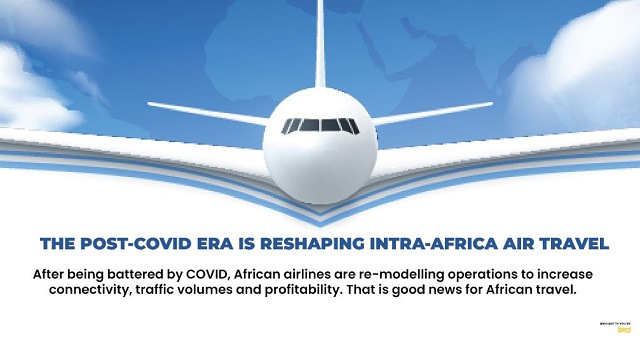After being battered by COVID, African airlines are re-modelling operations to increase connectivity, traffic volumes and profitability. That is good news for African travel
SPECIAL FEATURE | BIRD STORY AGENCY | The launch of a portal to share route traffic data, including on underserved markets, connections and partnership opportunities, is the latest attempt by African airlines to shore up intra- Africa air travel numbers.
The route intelligence portal launched this October by the African Airlines Association (AFRAA) to give its 44 operator members access to Africa-specific data and analysis, is seen helping airlines develop more robust post-COVID recovery plans.
The portal “will facilitate data-driven decision-making on connectivity opportunities, passenger/cargo capacity, and route profitability to effectively meet the needs of the growing African aviation market,” said AFRAA Secretary General, Abdérahmane Berthé.
The latest development will complement the lobby group’s earlier proposal to create a roadmap for “hop and pick” and implement a Single African Air Transport Market (SAATM).
Under the “hop-and-pick” plan, carriers plying say intra-African routes between capital cities would be allowed to pick up and drop off passengers at other main and smaller airports along the route – allowing them to reduce losses and carry more passengers.
By the end of September, data compiled by the association showed intra-Africa passengers represented only 29.5 percent of air passenger traffic, a significant opportunity for regional airlines.
In early October, Zimbabwe became the latest country to join the single Africa air transport market, committing to open up its skies and encouraging fair competition between airlines from other markets.
“By Zimbabwe signing into SAATM, means the country is committed to lift market access restrictions for airlines, grant fellow SAATM members countries air traffic rights(first through fifth freedoms), and liberalises flight frequency and capacity limits,” Zimbabwe’s minister of Transport and infrastructure development, Felix Mhona told local media.
Zimbabwe is now the 22nd to join the common market, out of 35 African countries that committed to it in 2015.
Large African airlines are also seeing major opportunities by entering local markets in other countries. Nigeria Air, which collapsed two decades ago, is currently being resuscitated by Ethiopia Airlines. In late September, Ethiopian, the largest airline on the continent, won a bid to become Nigeria Air’s lead technical partner and single largest shareholder, with a 49 percent stake.
“The National Carrier, Nigeria Air, is well on its way to being launched with three Boeing 737-800 in configuration very suitable for the Nigerian Market,” said Nigerian Minister of Aviation, Senator Hadi Sirika.
The airline plans to initially launch shuttle services between two major Nigerian airports – Abuja and Lagos before expanding to other destinations.
This latest acquisition opens Ethiopian Airlines to the biggest West African markets and puts it ahead of other pan-African focused airlines, like South Africa Airways, RwandAir and Kenya Airways.
After signing a strategic partnership framework in November 2021, the South African and Kenyan national carriers listed Nigeria among key markets for an expansion plan under a code-share agreement.
At an investor briefing in Nairobi in March, Kenya Airways Chairman, Michael Joseph announced the intention to link up with a West African airline to deployment a three-hub strategy focused on Nairobi, Johannesburg and West Africa.
Privately owned airlines are also racing to fill in the gap left by struggling state-owned operators as they look to tap into regional markets.
South Africa’s Airlink in late September, acquired a 40 percent stake in FlyNamibia, in a strategic move to fill up the gap left after the collapse of state-owned Air Namibia, in early 2021.
Fly Namibia will now codeshare with Airlink to ply the latter’s 45 routes – including Ghana, the Democratic Republic of Congo, Kenya and Malawi.
Low-cost Emirati carrier, Air Arabia has also announced a joint venture with Sudanese conglomerate DAL Group to launch Air Arabia Sudan. The new airline will gain access to over 120 destinations, including Egypt and Morocco.
Passenger numbers to, from and within Africa are expected to recover more gradually than in other regions, surpassing pre-crisis levels only in 2025, according to the International Air Transport Association (IATA).
IATA said it expects overall air traveller numbers to reach 4 billion in 2024 (counting multi-sector connecting trips as one passenger), exceeding pre-COVID-19 levels.
****
SOURCE: **bird story agency**
 The Independent Uganda: You get the Truth we Pay the Price
The Independent Uganda: You get the Truth we Pay the Price






